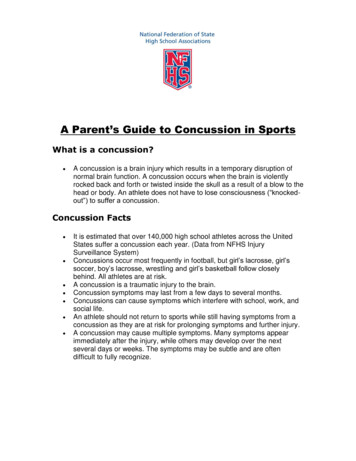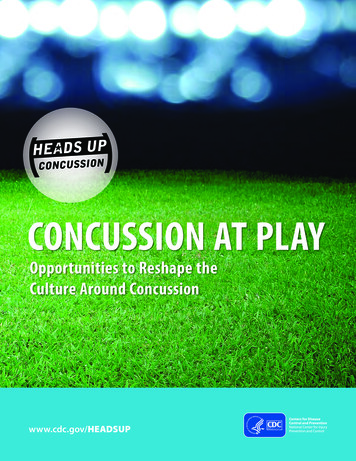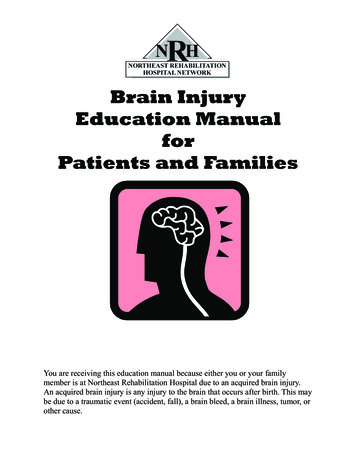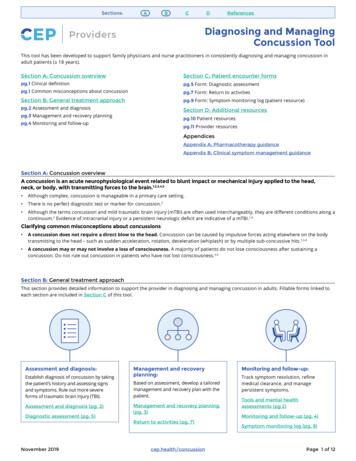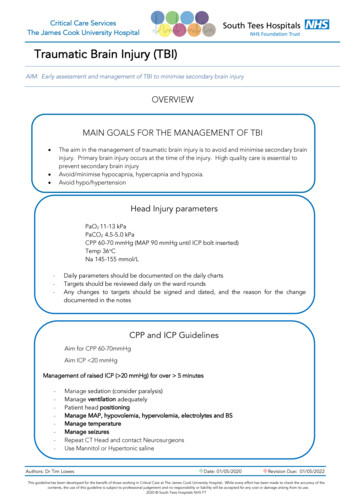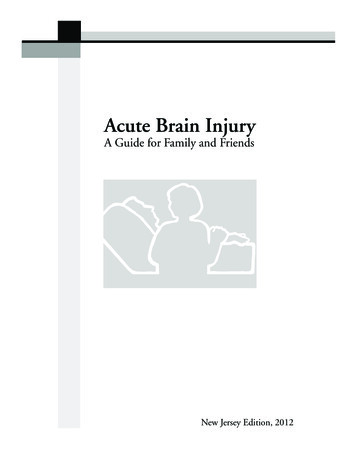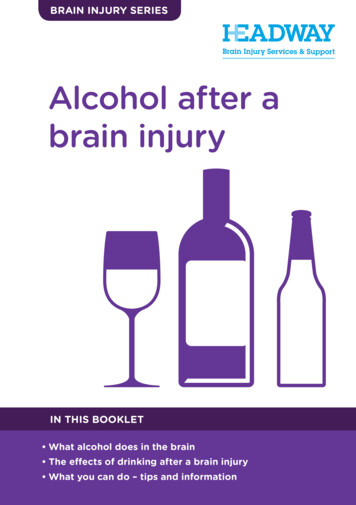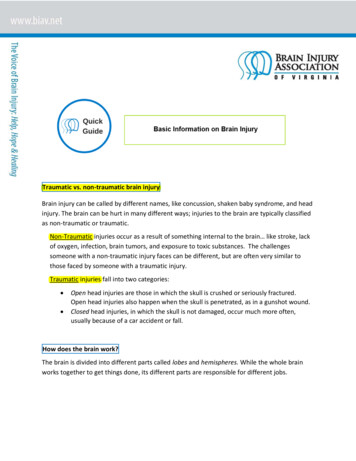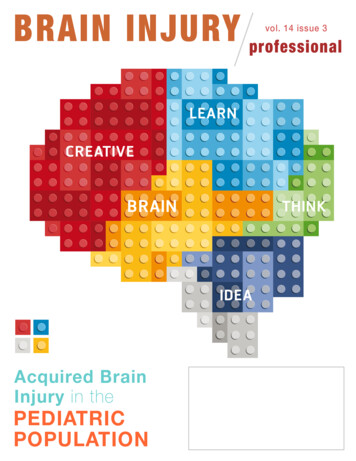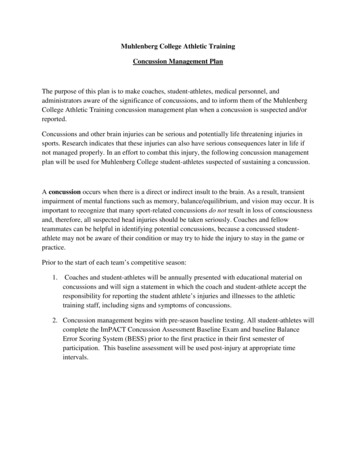
Transcription
ConcussionThe Child Brain Injury Trust is a national charity supporting anyone affected by childhood acquired brain injury. The following information has been developed to helpthe reader understand more about brain injury and some of the associated issues. Every effort has been taken to ensure the information is accurate and up to date.If you require more immediate support or assistance please contact our Advice, Information & Referral Service on 0303 3032248.The following E-Learning sessions which families and some professionals can access free of charge mayalso be beneficial:Understanding Childhood Acquired Brain InjuryBasic Brain Anatomy and FunctionsConcussions (including sports concussions)This Factsheet provides some basic information about concussions (including sports concussions) and acquiredbrain injury (ABI); if you have any concerns about a child or young person you should refer to your GP or the localhospital or telephone 111. Concussions can occur during general play in a playground or at home as well as during sports such asfootball or hockey. A child or young person does not have to have been unconscious, or “knocked out” for concussion tooccur. Concussions can occur from a blow to the body that causes the head to move rapidly back and forth; it isnot necessarily as a result of a direct blow to the head. Any kind of concussion is classified as a head injury or traumatic brain injury (TBI); both are ABIs. Concussion can be described as “a temporary injury to the brain that cannot be seen on routine X-rays orCT scans. It affects the way a person may think and remember things for a short time.” (1)Produced by: The Child Brain Injury Trust Tel: 01869 341075 office@cbituk.org www.childbraininjurytrust.org.ukThis information was written in accordance with our Information Production Process based on the principles of the Information Standard.Registered Charity Number: 1113326 A charity Registered in Scotland SC 039703 Registered Company Number: 5738517 VAT Registration 125 7951 96
Most people with a concussion recover quickly and fully. But for some people, symptoms can last for days,weeks, or longer. In general, recovery may be slower among young children and teenagers. Those who havehad a concussion in the past are also at risk of having another one and may find that it takes longer to recoverif they have another concussion.If the young person has been playing a sport the following questions should be asked to determine if aconcussion may have occurred: Where are we now?Is it before or after lunch?Who scored last in this match? (if appropriate)What did you have last lesson/class?What is your teacher’s name?Failure to answer any of these questions correctly may suggest a concussion (2)What should happen immediately following the concussion?In the case of sports concussion the child or young person should immediately be withdrawn from the field ofplay and not be permitted to continue. It cannot be stressed enough that it is NOT advisable to continue playing.Many children and young people will however feel that they are letting their team down and will say they feelfine and to play on - adults should reassure them that it is OK to stop and also important that they stop.Symptoms to check forIt is important to observe the child or young person after a concussion and to check for the following symptoms(2). If the young person has any of these symptoms they should be checked by a medical professional. Is dazed or stunnedMoves clumsilyAnswers questions slowlyForgets events prior to the hit or fallForgets events after the hit or fallHas trouble sustaining attentionIs easily distractedHas difficulty concentratingHas problems remembering what he/she is toldHas difficulty following directionsTends to daydreamGets confusedIs forgetfulHas difficulty completing tasksHas poor problem solving skillsHas problems learningHas headachesFeels dizzyProduced by: The Child Brain Injury Trust Tel: 01869 341075 office@cbituk.org www.childbraininjurytrust.org.ukThis information was written in accordance with our Information Production Process based on the principles of the Information Standard.Registered Charity Number: 1113326 A charity Registered in Scotland SC 039703 Registered Company Number: 5738517 VAT Registration 125 7951 96
Has a feeling that the room is spinningFeels faintHas blurred visionHas double visionExperiences nauseaGets tired a lotGets tired easilyThe child or young person may report the following symptoms (2). Again, if any of these symptoms are reportedthe young person should be assessed by a medical professional. I have headachesI feel sickI feel dizzyI feel like the room is spinningI see doubleThings are blurry when I look at themI feel like I am going to faintI have trouble figuring things outI have problems remembering what people tell meI get confusedI have problems finishing thingsI get distracted easilyI get tired a lotI get tired easilyIt is hard for me to learn new thingsI have a hard time concentratingAny child or young person with signs of a concussion should ideally receive medicalevaluation as soon as possibleWhat actually happens when a child or young person is concussed?In very simple terms, following a concussion/ knock to the head there is a disruption in the normal connectionswithin the brain which means that messages cannot travel to and from the brain and around the body. Theconnections are similar to elastic bands that can snap if they are stretched too far. This is why rest (physical andmental) is so important following any form of concussion.Some of the effects after concussion are short term, however, some can be long term. Repetitive concussionsincrease the risk of damage to the brain which is why it is important to stop playing if a concussion occurs.What should happen following a concussion?Once the child or young person has been removed from the current activity or game, they should be givenCOMPLETE REST until all of their symptoms have cleared - this means they should avoid: PLAYING ANY CONTACT SPORTSSTRENUOUS PHYSICAL EXERCISE/ACTIVITYCOMPUTER/MOBILE PHONE GAMESBRIGHT LIGHTS/LOUD NOISESHow long should the child or young person abstain from the activities above?Produced by: The Child Brain Injury Trust Tel: 01869 341075 office@cbituk.org www.childbraininjurytrust.org.ukThis information was written in accordance with our Information Production Process based on the principles of the Information Standard.Registered Charity Number: 1113326 A charity Registered in Scotland SC 039703 Registered Company Number: 5738517 VAT Registration 125 7951 96
Each child is different and the time it takes for symptoms to dissipate will depend on the individual – there is noset time frame. The child or young person should abstain from the activities until such time as they are clear ofALL observations and symptoms mentioned above. If in doubt at ANY point you should seek urgent medicaladvice.Should the child or young person be at school?As long as the symptoms and observations continue, the child or young person should also remain at home andoff school for a period of time following their concussion; it is not possible to say how long they should be offschool for as each child is different. It is useful if a graded return to school can be arranged. Speak to your child’steachers and explain that there has been a concussion. For example, if fatigue is a problem, the child or youngperson should return to school for half a day to start with, gradually building up to a full return to school. If thereare physical or cognitive problems after the concussion, the school should take account of these and it may beable to provide help. See other Child Brain Injury Trust factsheets on related topics such as behaviour, sleep, andeducation: rent-and-professionals/factsheets/How soon should a child return to activity/sports following concussion?Children/young people should not return to any physical sport or activity until they are completely symptom free,which could mean days or weeks. Additionally, there should be a period of no contact sports to avoid the risk of asecond concussion. The National Institute for Health and Care Excellence recommends that children and youngpeople do not play contact sports for at least 3 weeks after a concussion or head injury (3).What can be done to prevent concussion?It is not possible to prevent concussion in sports or in general play, and we would not recommend stopping theseactivities to reduce risk of concussion – sports and play are part of growing up. However as parents we can makesure that children and young people wear suitable protective headgear and equipment at all times, that iscorrectly fitted and suitable for the activity.Further InformationApplications are available for Smart Phones and Tablets which provide concussion checklists. Having thisinformation to hand could be useful when a concussion occurs at a game or match.The Child Brain Injury Trust has other Factsheets in this series which will help provide more detailed informationshould you require it.References:1. Helmy, A., Agarwal, M., Hutchinson, P.J. (2013) Concussion and sport. British Medical Journal. 13:347:f5748. Concussion in Sport Group (2013) Sport Concussion Assessment Tool 3 (SCAT3).3. National Institute for Health and Care Excellence (2014) Head injury: Triage, assessment, investigation and earlymanagement of head injury in children, young people and adults. CG176.2MAKE A DONATION TODAYThe Child Brain Injury Trust relies on grants and donations to enable us to continue our worksupporting families affected by childhood acquired brain injury.Please help us to continue our work by making a donation today – CLICK HERE to make a one offdonation or set up a monthly gift.Produced by: The Child Brain Injury Trust Tel: 01869 341075 office@cbituk.org www.childbraininjurytrust.org.ukThis information was written in accordance with our Information Production Process based on the principles of the Information Standard.Registered Charity Number: 1113326 A charity Registered in Scotland SC 039703 Registered Company Number: 5738517 VAT Registration 125 7951 96
Thank you – your donation does make a difference.Document ControlDocument IDIssue DateLast ReviewedNext Review due byVersion NumberDoc 141August 2015August 2017August 2019V 1.1Produced by: The Child Brain Injury Trust Tel: 01869 341075 office@cbituk.org www.childbraininjurytrust.org.ukThis information was written in accordance with our Information Production Process based on the principles of the Information Standard.Registered Charity Number: 1113326 A charity Registered in Scotland SC 039703 Registered Company Number: 5738517 VAT Registration 125 7951 96
second concussion. The National Institute for Health and Care Excellence recommends that children and young people do not play contact sports for at least 3 weeks after a concussion or head injury (3). . Concussion in Sport Group (2013) Sport Concussion Assessment Tool 3 (SCAT3). 3. National Institute for Health and Care Excellence (2014 .
